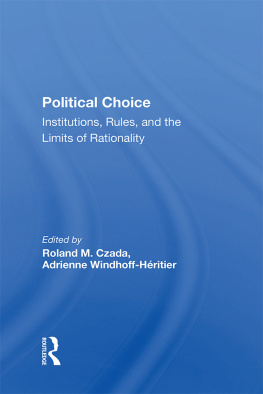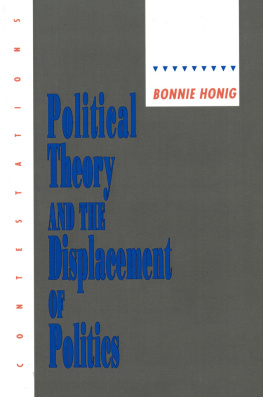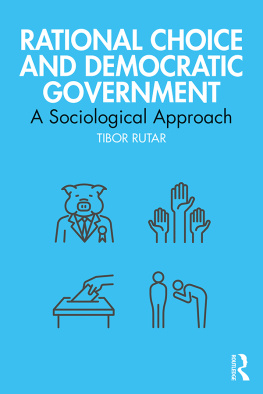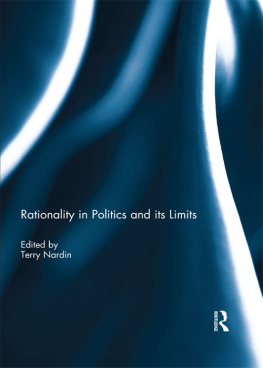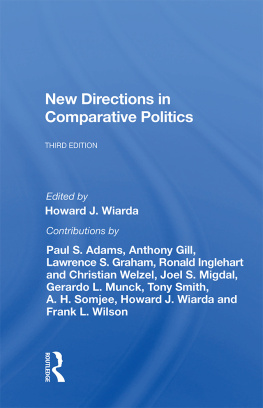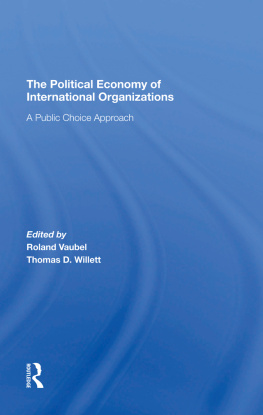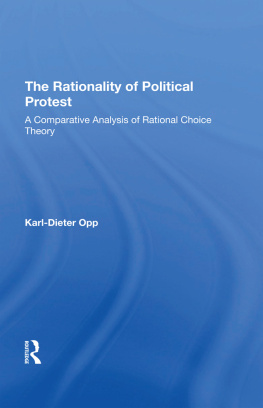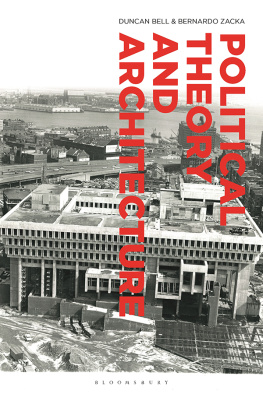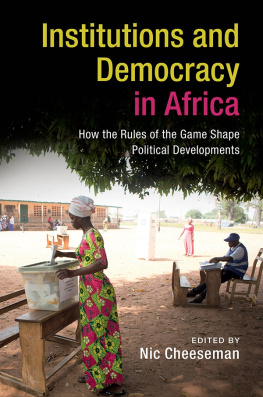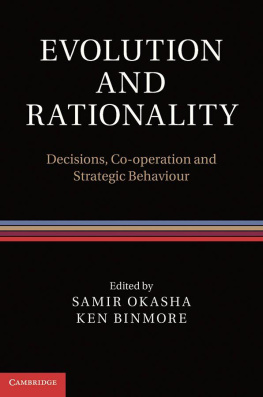Political Choice
Roland M. Czada,
Adrienne Windhoff-Hritier (Editors)
Political Choice
Institutions, Rules, and the Limits of Rationality
First published 1991 by Westview Press
Published 2019 by Routledge
52 Vanderbilt Avenue, New York, NY 10017
2 Park Square, Milton Park, Abingdon, Oxon OX14 4RN
Routledge is an imprint of the Taylor & Francis Group, an informa business
Copyright 1991 by Campus Verlag, Frankfurt am Main
All rights reserved. No part of this book may be reprinted or reproduced or utilised in any form or by any electronic, mechanical, or other means, now known or hereafter invented, including photocopying and recording, or in any information storage or retrieval system, without permission in writing from the publishers.
Notice:
Product or corporate names may be trademarks or registered trademarks, and are used only for identification and explanation without intent to infringe.
Library of Congress Cataloging-in-Publication Data
Political choice : institutions, rules, and the limits of rationality
/ edited by Roland M. Czada and Adrienne Windhoff-Hritier.
p. cm.
ISBN 0-8133-1164-0
1. Political science-Decision making. I. Czada, Roland M.
II. Windhoff-Hritier, Adrienne, 1944
JA74.P623 1990
306.2--dc20 90-40917
CIP
ISBN 13: 978-0-367-28339-1 (hbk)
Contents
Adrienne Windhoff-Hritier and Roland M. Czada
Adrienne Windhoff-Hritier
Fritz W. Scharpf
Johan P. Olsen
Gerhard Lehmbruch
Wolfgang Streeck
Marc Schneiberg and J. Rogers Hollingsworth
Franz Lehner
Roland M. Czada
Guide
I don't think that the system of selfinterest as it is professed in America is in all its parts self-evident, but it contains a great number of truths, so evident, that men, if they are only educated, can't fail to see them.
Alexis de Tocqueville, 1835
The idea of this book was born on the occasion of a birthday celebration that was held in Konstanz in honor of Gerhard Lehmbruch. Asked whether he would prefer an international conference or a publication as a present to his 60th birthday, Gerhard Lehmbruch did not hesitate to choose the conference. As it turned out, he has not been spared either one. A lively and fruitful academic discussion emerged at the conference, focusing on the interplay of institutions, collective action, and choices in politics. Contributions which explored recent major trends in theory-building have been included in this volume.
The authors proceed from different approaches: concepts of corporatism and network-analysis, organization theory, institutional economics, rational choice and game theory. Each of the chapters written by Gerhard Lehmbruch, Johan P. Olsen, Fritz W. Scharpf, Adrienne Wind hoff-Hritier, Wolfgang Streeck, Marc Schneiberg and J. Rogers Hollingsworth, Franz Lehner, and Roland M. Czada represents at least one of these fields of research. All focus, however, on the question: Which particular rules, logics, or strategies of action can be found in the realm of politics? As such "political choice" and, generally, the institutionalizat ion and mechanisms of governance and interest intermediation come to the fore.
Whereas structures and outcomes of interest intermediation in and between organized groups have been discussed in a large body of literature, the principles of political - in contrast to economic choice have rarely been analyzed. From an institutionalist point of view, political choices aim at and are influenced by organizational structures, conventional procedures, legal-administrative rules, and organizational incentives. Relations of choice and structure compose the logics of political action. The authors discuss these in terms of "garbage can solutions", strategic dilemmas, association-building, and social networking, as well as constraints, rigidities, or even pathologies of institutionaldecision-making.
We are grateful to many people for their help. The "Deutsche Forschungsgemeinschaft" (German Research Foundation), the "Fritz-Thyssen-stiftung" (Fritz-Thyssen-Foudation), and the "Freunde und Frderer der Universitt Konstanz" (Sponsors of the University of Konstanz) generously supported our international conference. We also like to thank all paper-givers and discussants, who, with the authors included in this volume, contributed to the liveliness and yields of the debate: Hans Daalder, Wolfgang Fach, Peter Gerlich, Henry J. Jacek, Berndt Keller, Peter Knoepfel, Michael Kreile, Claus Offe, Victor Pestoff, Manfred G. Schmidt, and Phillipe C. Schmitter. In particular, we wish to thank Karin Tritt, Hans Dieterle, Anne Hodgson, Njunga M. Mulikita, and Janett McPherson for seeing the book through publication and proof-reading.
Roland M. Czada
Adrienne Windhoff-Hritier
October 1990
Roland M. Czada, Assistant Professor, Faculty of Administrative Science, University of Konstanz
Rogers M. Hollingsworth, Professor of History, Sociology and Industrial Relations, University of Wisconsin, Madison
Gerhard Lehmbruch, Professor of Political Science, University of Konstanz
Franz Lehner, Professor of Political Science, Ruhr-University, Bochum, and President of the Institute for Work and Technology, Gelsenkirchen
Johan P. Olsen, Professor of Public Administration and Organisation Theory, Norwegian Research Center in Organization and Management, Bergen
Fritz W. Scharpf, Professor of Political Science, Director at the Maxplanck-Institute for Social Research, Kln
Marc Schneiberg, Lecturer at the Department of Sociology, University of Wisconsin, Madison
Wolfgang Streeck, Professor of Sociology and Industrial Relations, University of Wisconsin, Madison
Adrierme Windhoff-Hritier, Professor of Political Science, University of Bielefeld
I
Introduction
Adrienne Windhoff-Hritier and Roland M. Czada
We use the concept of political choice to express the thrust of argument underlying the contributions to this volume. It implies that there is a difference between the formation of social choice and actors' political choices. Politics is a process based on relations of conflict and consensus among interdependent individual and corporate actors. It depends on actors' deliberate choices achieved within specific institutional settings and results in decisions or policies that are binding for individual and corporate actors within territorial (state, county, municipality) or social organizational boundaries (firm, association). A potential sanctioning power is added to the mandatory character of these decisions. As far as state politics is concerned, this includes the legitimate use of physical force. Political choices, however, are not necessarily located within the state's organizational domain. Contractual relationships, private corporate hierarchies, or social associations employ such choices as well - although their ultimate legitimation is usually derived from state laws and governmental direction.
Political choices aim at desired macro states and imply actors' aspirations to guide social processes through collective action or individual interaction. Contrary to the functioning of markets or any other processes of transitory coupling between individuals, politics is characterized by actors ' attempts to manage micro-macro links of action. Therefore, the concept of political choice, in our view has to deal with efforts to coordinate mutually depent actors, organize collective action, and exercise social guidance in order to reach individually desired social states. Political choices attempt to overcome self-regulatory social processes.

